- Home
- Lynne Reid Banks
The Dungeon
The Dungeon Read online
To Chris, who read it first
Contents
Cover
Title Page
Dedication
Chapter One
Chapter Two
Chapter Three
Chapter Four
Chapter Five
Chapter Six
Chapter Seven
Chapter Eight
Chapter Nine
Chapter Ten
Chapter Eleven
Chapter Twelve
Chapter Thirteen
Chapter Fourteen
Epilogue
Also by the Author
Copyright
About the Publisher
Chapter One
Bruce McLennan, Scottish laird and master of all that lay in his sight, stood on the edge of a deep, wide, square pit. It was dug into the top of a crag that stood next to a river. The men who had dug it were standing around it, filthy, tired and covered with sweat. There were over a hundred of them, all tenants of the laird’s, and it had taken them two months to level the hilltop and dig the pit in one corner. All the work had been done with picks and shovels, and the spoil carried away in big baskets and cast down the hill. From a distance it looked as if the hill had been decapitated, with the pale blood of the inner ground flowing down its sides.
Bruce McLennan stared down into the newly-excavated depths. At the moment there was just a hole in the ground. But he could already see a dungeon.
He could imagine it lined with big blocks of stone. He could imagine iron rings in the walls, to which prisoners could be chained. He could imagine the huge wooden door with iron panels and hinges and lock, and a heavy brass key. He could even foreshadow a man, languishing down there in the raw depths, his prisoner – helpless, wretched, defeated – chained to the wall, not just a symbol of conquest but a real man, one he hated with his whole heart. Or what was left of it, for this villain had destroyed all that was precious and love-filled in the life of McLennan, leaving him a hollow man burning for vengeance, but not headstrong enough to go after it until he was ready.
At the laird’s side stood Master Douglas of Berwick. This man had led the building of fortresses and castles in several parts of Scotland, England and Wales. Only Bruce McLennan’s considerable wealth had gained him the services of this master builder, who stood now at a rough table that had been set up for him. He was poring over a number of large pieces of slate, on which were scratched drawings that he and McLennan had made together. He alone knew McLennan’s intentions and the extent of his ambition for this project.
‘Foreman!’ McLennan shouted. ‘Where the devil are ye? Och, there y’are! Now then.’ He chose one of the slate-plans and put it into the work-stained hands of his main man. ‘Here’s how the dungeon is to look when it’s finished, do ye ken?’
The foreman took the drawing and stared at it. It was a good drawing. He could feel he was looking down into the finished chamber, as if he were a bird flying above it, or rather, since of course it would have a ceiling, a spider crawling over it. A faint shudder passed across his shoulders. It would be a fearful place to be locked into.
‘Aye, sir.’
‘And here,’ McLennan produced more slates, ‘are the plans for the castle.’
The first plan showed a bird’s-eye view of an imposing square structure with a courtyard, or ward, in the centre. In this was a well – a vital adjunct should the castle ever come under siege. At the corners of the ward were four round crenellated towers (the dungeon would be underneath one of them), linked by walls with battlements, a main gate with two massive U-shaped gatehouses, a small postern gate that led down to the river, and a deep-dug moat in front, to be crossed by a ramp and drawbridge.
The next plan showed a side elevation, with very narrow windows, like slits, so arrows could fly out but couldn’t so easily fly in. A third, fourth and fifth gave a lot of detail, showing many rooms: a great hall, stables, storerooms and servants’ quarters, all to be built against the inside of the thick walls. The foreman stared at these in admiration. It would be an exciting and difficult project, even for an experienced engineer like himself.
It would need many workers – hundreds, possibly over a thousand. Digging was just the start of it! They would need quarriers to bring the stone for the building; stone masons to build the mighty walls, many feet thick, with skins of mortared stones packed with rubble between; blacksmiths to make and mend iron tools; plumbers to create cisterns and latrines; and carpenters to make scaffolding and later, the floors, for the castle would have two storeys. In addition there would have to be hundreds of unskilled labourers.
‘Any questions?’ barked his master.
‘Aye, m’laird. How are the needful workers to be found? Where are they to live?’
McLennan picked up another plan from the pile of slates on the table.
‘Ye see where my house is, down there below?’ He pointed to a large timber-framed manor house at the foot of the crag. ‘It won’t stand alone for long! Men will come when they are offered good wages, cheap homes and farmland, and my protection against danger. While the first levelling and digging is going on, ye’re to send men as far afield as Edinburgh to recruit. Word will spread! By the time I get back from my travels, I’ll lay there’ll be a small town where my house is, and farms and hamlets besides, all over my land.’
‘Ye plan a journey, m’laird?’
‘Aye. A long, long journey,’ replied McLennan drily. He glanced at the master builder at his side. ‘And that’ll please you, Master Douglas, I dunna doubt! Ye’ll have a free hand, without me here to nag and interfere with ye. As for you, Foreman,’ he added, ‘dunna think because the cat’s away, the mice can play. I’ve engaged some overseers to make sure no one slacks.’
The foreman bit back a retort. It irked him sometimes that this man, as lowborn as himself, and lower, should have such power over him. Especially now, since he was so sorely changed from the man he had been once. Not that that was to be wondered at, after what had happened to him.
‘Will ye afford a wall around this – this township, m’laird?’
McLennan thought for a moment. ‘There’s no need for a stone wall. A wooden palisade with earth ramparts within will suffice.’
‘And if there should be a raid or any trouble while ye’re away, what then?’
‘We’re too far from the border for the English to come at us.’
‘I was thinking of a closer enemy,’ the foreman said under his breath.
There was a bad moment of silence. Then McLennan said, in an unnaturally quiet voice, ‘Lightning doesna strike the same place twice.’
The man had the sense to say no more on that subject. Instead he said respectfully, ‘I trust ye’ll no’ run into danger yourself, sir.’
‘I trust I will,’ returned McLennan obscurely.
The foreman thought he had misheard.
‘How long will ye be away, sir?’
McLennan lost patience and roared at him. ‘How the blazes d’ye expect me to know that? My plan is to travel to the far ends of the earth. Whatever I find there, I’m planning to see plenty of it, before I turn around and come back!’
The foreman looked at the plans again. When his laird flew into these sudden rages, it was better not to meet his eyes.
‘Sir?’ he ventured timidly.
‘Well?’
‘I see no chapel on the plans.’
‘That’s because there will be none.’
Now the man’s head did come up, and he looked at his master. Bruce McLennan towered over him. He had flaming red hair and a bushy red beard. His strong, bare legs below his kilt were planted apart; his arms, brawny and hairy as a pig’s flanks, were folded across his chest, compressing his plaid which blew back in the
wind. He looked a mighty man indeed. Not one to cross – every man present knew that.
‘No – place of worship, m’laird?’
‘Not in my castle. If, outside it, ye feel the need for a church, ye can build one, but in your ain time and with your ain money.’
There was a tense silence. Was there a touch of blasphemy here? Many eyes went to Master Douglas, who was reputed to be a devout Christian; but if he had felt scandalised on first learning of this unheard-of omission, he showed nothing now.
‘How long have we to complete the work?’
‘Here is the only answer I’ll give ye,’ said the master. ‘When I choose to come back, my castle had better be standing up against yon sky, and my dungeon had better be below it. If not, I’ll hang the lot o’ ye from whatever ye have built. Do I make myself understood?’
There was a cowed silence around the dungeon pit. There was hostility in that silence, too, but it was lost on their master. Though once he had been different, now he cared nothing for their good opinion so long as they obeyed him. And obey him they must, for he was their liege-laird, and they his tenant-serfs, not much better than slaves.
Half an hour after the last workman had left the site, and McLennan had retired to his house to prepare for his journey, a young boy called Finlay McLean climbed up the disturbed and treacherous slope. The sun had set beyond the river and the lad had to grope his way forward and upward over the shifting ground in deepening twilight. Several times he lost his footing and slipped and slithered down several feet, and once he fell forward on his belly and had to dig his fingers into the loose soil and stones to stop himself sliding to the bottom of the crag.
Once he had gained the levelled top, he doubled up and ran to the edge of the dungeon pit. He feared the master might be watching from his window at the foot of the hill and see his silhouette. But when he reached the pit’s edge he knew he would be hidden from below, and he straightened up and stared downward into the darkening depths.
He couldn’t rightly see through the shadows to the bottom. He thought he might as well be looking down into The Pit as described by the priest in the course of his many warning sermons. Fin fancied if he stumbled over the edge, he would fall and go on falling till he reached that furiously burning region in the middle of the earth, where the damned were subject to unending torment.
Yet the curiosity that had brought him up here, held him.
He knew who this dungeon had been dug for. His name was Archibald McInnes, a name Fin had never heard spoken aloud, even by his father in his own home – a farmhouse two miles away – from where he came to work in the master’s stables. In whispers they spoke that name, and that name’s crimes, crimes that had changed a good man, a good laird, into one to be feared. The whispers told how the whole feud had begun, with a dispute over the border between the lands of the two lairds who were neighbours. How there had been a skirmish in which the neighbour’s nephew had been killed. And what followed, a tale too terrible to be told before a child; but Fin had heard it anyway, as children do who have their ears open on the brink of sleep when adults think they are over that brink, and speak more freely than they should.
A terrible tale. A dreadful happening, dark with blood and cruelty, a crime crying out for vengeance. Yes, thought Fin, shivering as he peered into the blackening depths as the sky darkened over him. If his master captured McInnes and brought him back here – as clearly he meant to, one day, when his castle was built and he had enough men owing him allegiance to be sure of success – the villain would deserve to be hurled down there, down, down, into the pitchy gloom, however deep it went, and never to be seen on the warm bright surface-earth again.
Fin was in the stables of the manor house a week later, on the day Bruce McLennan set off on his travels. He had not had the honour of grooming and saddling his horse. Robert the head groom did that. Nor was it Fin who led the animal out and handed the reins to the master. But it was Fin’s job to hold the opposing stirrup as the laird mounted. He had almost to swing on it to balance the master’s weight and keep the saddle from slipping.
McLennan didn’t notice the young tow-headed lad level with his heel as he swung himself into the saddle. He couldn’t know, as he scraped the boy’s knuckles with his boot, what a fateful role this grubby nondescript boy, staring up at him in awe, would play in his future. He left him behind as he left everything behind, and rode away without a glance back.
He’d had no one to say goodbye to. He had handed the keys of his house to Master Douglas. It was full of appalling memories and he was glad to be shot of it for ever. He wouldn’t need it when he came back. He’d have a castle to live in by then – a castle with a dungeon. The idea of it was like balm spread over a wound, in a place in his soul even deeper than the dungeon pit.
‘Do unto others!’ he thought fiercely as he rode. So said the scriptures. Aye. Do unto others as they have done unto you.
He rode down the length of the northern island that comprises Scotland, England and Wales, to its south coast. This took days – and several horses, for he was a hard rider. He put up at wayside inns when he found them, and when he didn’t he would camp outdoors. When there was a reasonable road (the best had been built by the Romans ten centuries before) and some moonlight, he would ride far into the night to put off having to sleep alone under the sky, or eat and drink without company to distract his mind.
Sometimes when he was sitting by a campfire on some desolate moor or under some ancient oak in the depths of a forest, memories would come back to him of his childhood in a modest croft on the island where his father was a fisherman and his mother spun sheep’s wool and wove cloth from it to sell. He remembered these two people he had loved, and his brothers and sister, and the happiness he had known as a wild young boy, torn between family affection and a driving restlessness. Sometimes he even thought he could smell the good smells of fish and the sea, of the steaming soap-vats in which his mother washed the wool; he would hear the sounds of young lambs in the spring bleating for the ewes, and feel the warmth of his bed with his brothers sleeping close to him while the peat fire made a glow on the low, whitewashed ceiling until it died away.
These pleasant memories had a double power. They let him relive his happy, humble childhood, and they made him proud, by contrast, of his present high position. It was not often a fisherman’s son rose to become a laird, owner of a large estate with command over several hundred tenant-serfs who owed him unquestioning loyalty. And he had earned this elevation, not merely inherited it.
He might have blushed to remember why he had resisted becoming a fisherman like his father – seasickness – but he had forgotten that. What he remembered was travelling south alone to volunteer in the King’s service against the English, who were striving fruitlessly but bloodily to subdue Scotland. He did the King great service, even saving his life on one occasion when he was thrown from his horse on the field of battle. What a piece of miraculous good fortune that the young McLennan had been nearby at that fateful moment. Nineteen years old, strong and quick and with the recklessness of a highland bull, McLennan had fought his way swiftly to his monarch’s side, and carried him over his broad shoulder to safety while the horses trampled and neighed and the swords clashed around him… For this action, the King had rewarded him royally with land and gold, and put him in the way of a beautiful highborn wife.
But when his proud recollections reached this point, McLennan seized hold of them and slammed a door on them, a door as thick and ironbound as the one he had ordered for his dungeon.
At last he reached the south coast. He wandered from port to port in growing impatience, haunting the quayside taverns, hungrily watching and listening. But he could only hear of ships sailing to ports in Europe. They were not what he wanted.
Then his luck changed. He had drifted up to the Port of London. Most men from the north who had never before seen the biggest town in the islands would have spent hours and days exploring the bustling streets, some gr
and, some vice-ridden and squalid, yet offering much entertainment… But McLennan was single-minded. He made straight for the dockside and there, in a cheerful tavern reeking of stale ale and unwashed bodies, he met a common sailor who had heard the stories he himself had heard.
‘Ho, yus, Marco-Polo-land! Chi-na, they call it. It’s a rare place, they say! But you can’t sail all the way there,’ he went on, when McLennan had stood him some ale. ‘You’d have to do as he did, the Venetian, sail to St. Jean d’Acre, the port of the Crusaders in the Holy Land, or to Constantinople – that’s in Turk-land, I been there! – and after that you must go by land. A year’s journey, they say, or more if the weather’s against you, along the road the silk comes by.’
‘Silk? What’s that?’
‘Wot, ain’t you heard of silk? I ain’t never seen it, but they say it’s the most wonderfullest stuff in the world,’ the sailor said.
‘Is it food?’ asked McLennan.
The man blew his ale out in a spray of laughter. ‘Course not, it’s not for eatin’! It’s for wearin’! But you’ll never feel the touch of it on your back. How they make it’s a secret – it’s not something that grows from the ground. I heard a venomous spider spins it, and only them that’s immune to its poison can harvest it. It’s that rare and costly, only royalty, or highborn lords and ladies, can buy it! It has to be brought a journey of ten thousand miles, they say, across land where no civilised man can live, for it’s all desert and icy mountains, and the way plagued by tribes of the fiercest riders and fighters in the world.’ He lowered his voice and put his mouth close to McLennan’s ear. ‘Ain’t you never heard of the Mongols and Tartars?’
McLennan shook his head. His heart was beating with excitement. This was what he had dreamed of. A dangerous venture that would shut out the past and truly test his mettle!
‘They’re the most monstrous cruel men God ever made,’ the man continued in a whisper, as if a Mongol horde might even now ride into this dingy tavern and slaughter the drinkers. ‘They’ve conquered all the lands of the east! Chi-na, too. They rule it now, and the Chi-na men can like it or lump it. ’Tis said they’ve the best army since the days of Rome. Nay, better! They fight on horseback, and each man rides as if him and his horse were one beast. As to their natures—’ he grimaced. ‘Say no more! If a town resists ’em, they wipe it out, down to the last man, woman and child!’ And he made a throat-cutting gesture, accompanied by a graphic squelching sound. ‘And that’s their best weapon, for after a few massacres of that sort, none dare stand against them, so they’re unbeatable!’

 Two Is Lonely
Two Is Lonely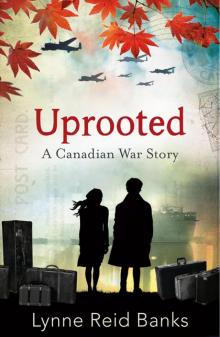 Uprooted - a Canadian War Story
Uprooted - a Canadian War Story The Backward Shadow
The Backward Shadow Harry the Poisonous Centipede: A Story to Make You Squirm
Harry the Poisonous Centipede: A Story to Make You Squirm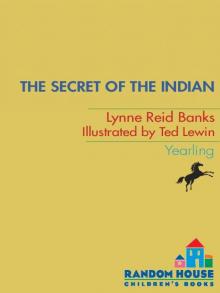 The Secret of the Indian (The Indian in the Cupboard)
The Secret of the Indian (The Indian in the Cupboard) The L-Shaped Room
The L-Shaped Room The Mystery of the Cupboard
The Mystery of the Cupboard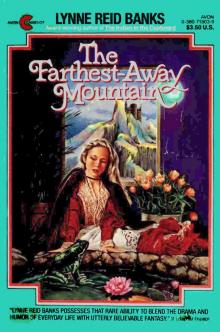 The Farthest-Away Mountain
The Farthest-Away Mountain Harry the Poisonous Centipede Goes to Sea
Harry the Poisonous Centipede Goes to Sea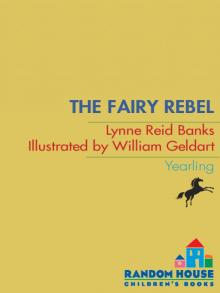 The Fairy Rebel
The Fairy Rebel Harry the Poisonous Centipede's Big Adventure: Another Story to Make You Squirm
Harry the Poisonous Centipede's Big Adventure: Another Story to Make You Squirm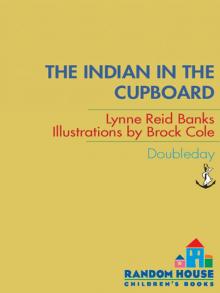 The Indian in the Cupboard
The Indian in the Cupboard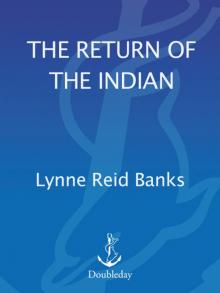 The Return of the Indian
The Return of the Indian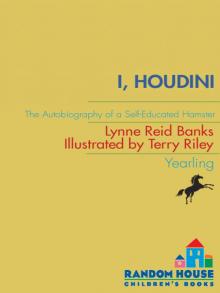 I, Houdini
I, Houdini The Key to the Indian
The Key to the Indian The Warning Bell
The Warning Bell Alice by Accident
Alice by Accident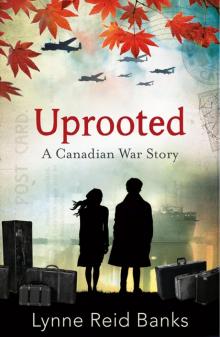 Uprooted
Uprooted Writing On the Wall
Writing On the Wall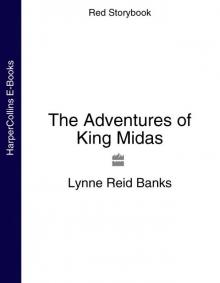 The Adventures of King Midas (Red Storybook)
The Adventures of King Midas (Red Storybook) Harry the Poisonous Centipede's Big Adventure
Harry the Poisonous Centipede's Big Adventure Harry the Poisonous Centipede
Harry the Poisonous Centipede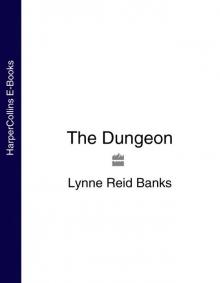 The Dungeon
The Dungeon Bad Cat, Good Cat
Bad Cat, Good Cat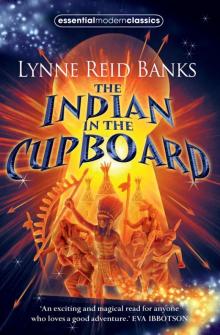 The Indian in the Cupboard (Essential Modern Classics, Book 1)
The Indian in the Cupboard (Essential Modern Classics, Book 1)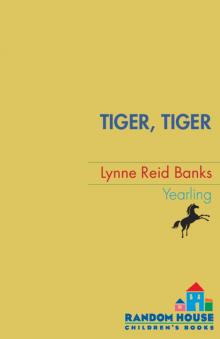 Tiger, Tiger
Tiger, Tiger